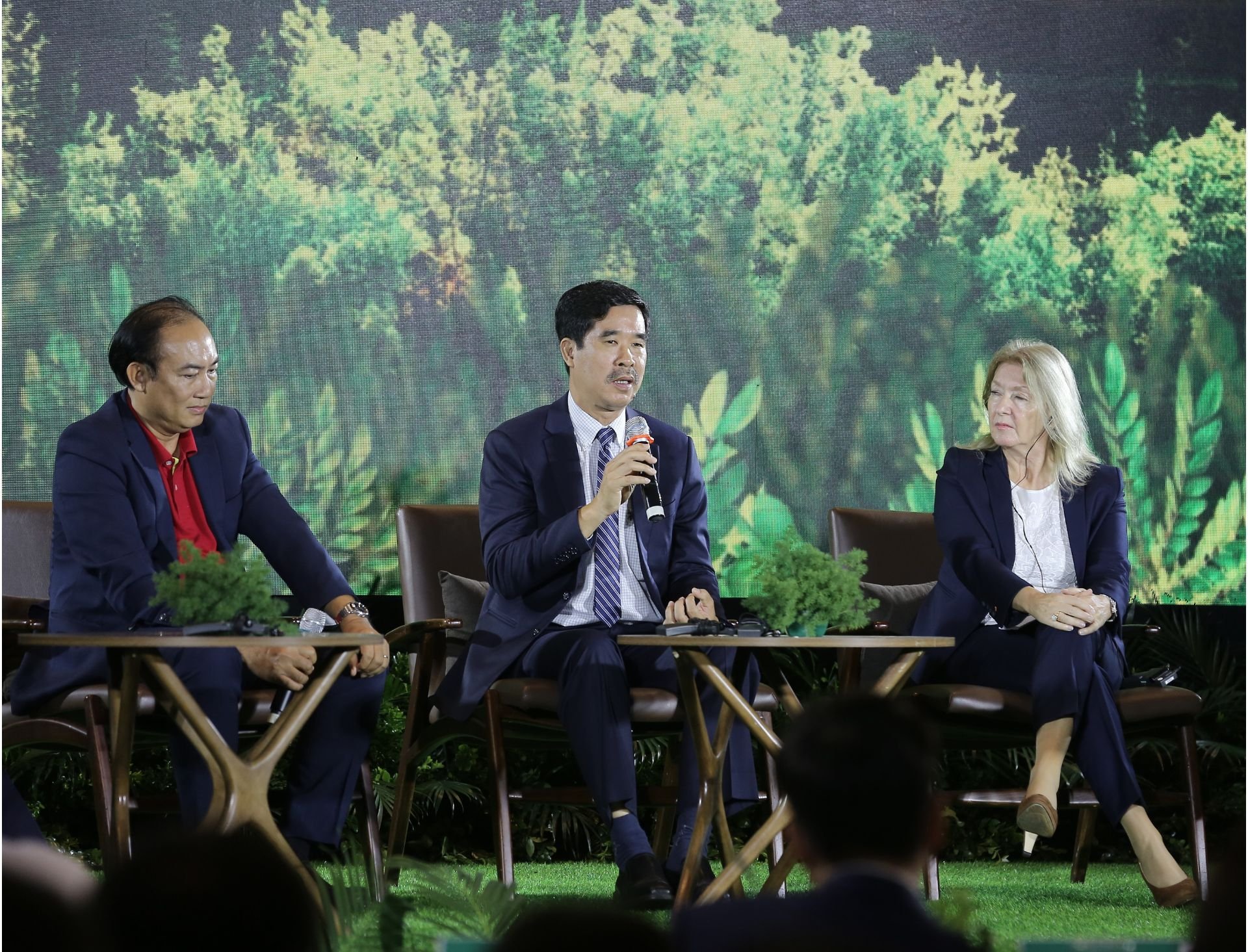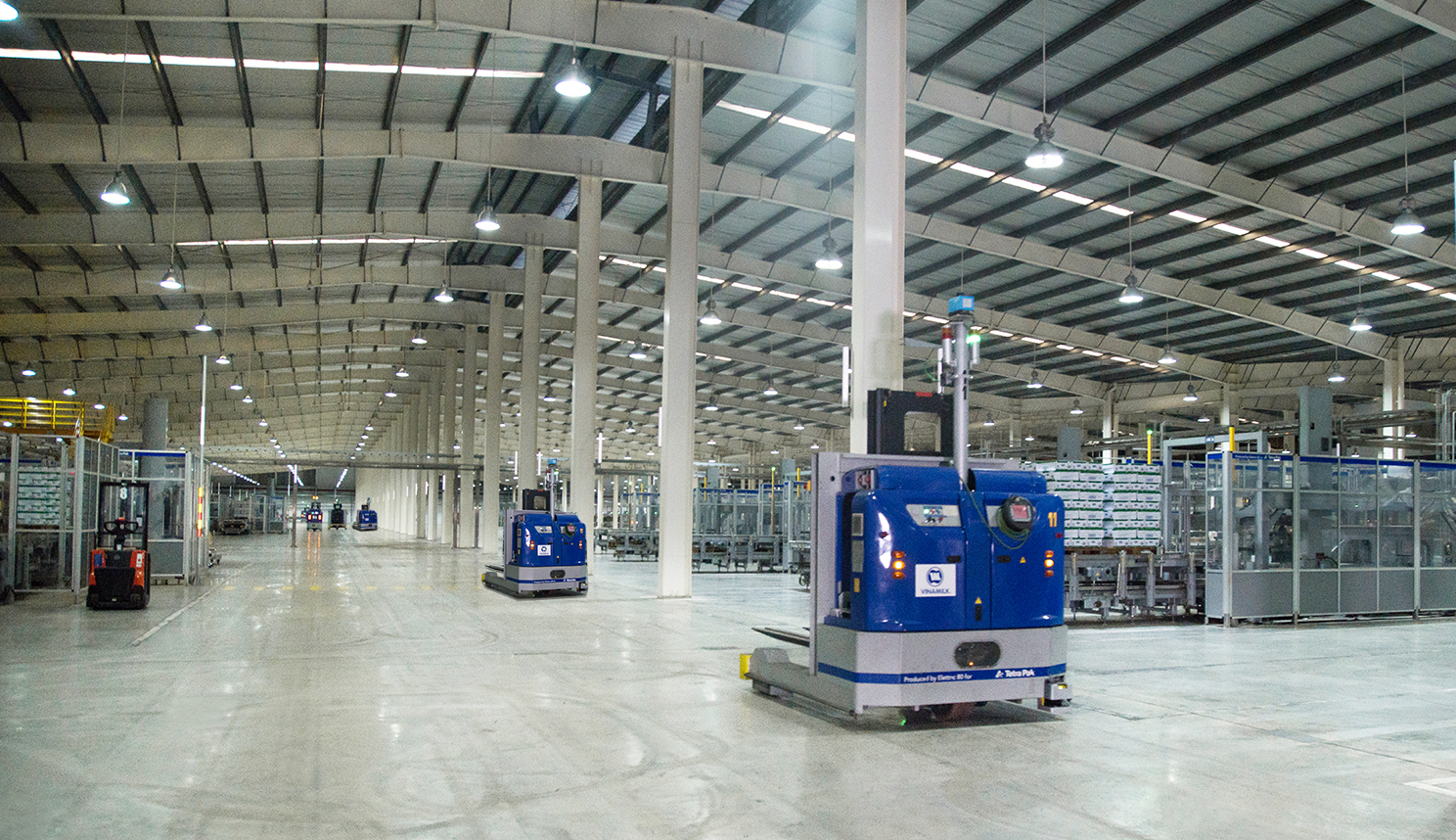June 5, 2025 | 09:53 GMT +7
June 5, 2025 | 09:53 GMT +7
Hotline: 0913.378.918
June 5, 2025 | 09:53 GMT +7
Hotline: 0913.378.918
Asking whether Net Zero is a game of the rich, we received some thoughts from Mr. Nguyen Quoc Khanh, Executive Director of Research and Development (R&D), Steering Committee of Vinamilk’s Net Zero project at the International Conference Net Zero - Green Transformation: Opportunities for Leaders, recently held in Hanoi.
Among many topics related to sustainable development, strategy towards Net Zero emissions is discussed at the Conference. The first question in the conference is whether Net Zero is a game of the rich, which attracts a lot of attention from the audience.
According to a quick survey at the Conference, investment costs related to sustainable development and green transformation are not insignificant. “The rich” are not only individuals but, more broadly, are also businesses and countries with great economic potential.
Addressing the question, Mr. Nguyen Quoc Khanh, R&D Executive Director, and Vinamilk representative in the seminar, says that the rich and poor are integral as climate change is affecting every person, and every part of society, directly affecting our daily meals and daily lives.
"Everyone is equally, negatively affected, starting from daily meals. I think Net Zero is not a luxury game for the rich but a duty, responsibility, and priority. The most important thing is the right to live a life better and safer,” Mr. Khanh affirmed.

Mr. Nguyen Quoc Khanh, Executive Director of R&D Vinamilk (middle), speaks at the Seminar Net Zero - Green Transformation: Opportunities for Leaders.
Mr. Khanh states that a sustainable development project, like any other project, all have to calculate investment costs and profit margins. Vinamilk has been investing for ten years now, so if other enterprises can invest early, it will reduce the cost and increase the benefits.
Vinamilk invests in waste reduction and environment-friendly technologies, including operation management software to increase efficiency, optimize energy for machinery and equipment, LGV robots to replace old forklifts which help reduce emissions by up to 62% or a heat recovery system that recovers up to 92% of excess heat and reuses it to save electricity.
This business estimates that saving resources for the future will bring benefits that exceed the initial investment cost, especially when the prices of raw materials and fuel are more and more expensive nowadays.

Modern LGV robots reduce emissions by 62% compared to traditional forklifts.
Besides, Mr. Khanh said, small and medium-sized enterprises that do not have the capital or resources to invest in large transformation projects, can still participate in green transformation activities in accordance with the production model and enterprise scale.
From another perspective, actions to protect the environment, such as reducing plastic waste or saving water and electricity, are almost inexpensive and can be applied on a daily basis.
Therefore, according to Mr. Khanh, the gist here is the mutual awareness of the leaders, employees, and the whole community that will affect green transformation actions.
Experts from international organizations attending the conference also said that in addition to “self-transformation,” Vietnamese enterprises need to quickly prepare strategies, awareness, and knowledge so as to take advantage of green capital sources, and investment support, especially during this period.
In fact, green transformation is a long road with many difficulties. Data shows that 37 billion tons of CO2 were emitted globally in 2022 - the highest number since 1900.
In 2022, the World Bank estimated that Vietnam might need to invest about 368 billion USD until 2040, equivalent to 6.8% of GDP per year when pursuing the path towards sustainable development and Net Zero.
Particularly, decarbonization shall meet international commitments and account for about 30% of resource needs.
"However, the public sector will only be able to provide about one-third of the required resources. The green financial market is currently in the early stages of resource development, so mobilizing through the green financial market is very small compared to the demand," Minister of Finance Ho Duc Phoc emphasizes at the seminar.
Hervé Conan, Director of AFD Vietnam, states that climate change will affect quality of life and the economy across the globe. If the temperature increases by 3 degrees Celsius, it will negatively impact over 10% of global GDP.
In just one year, the financial cost of natural disasters has tripled, reaching $830 million in 2022.
Meanwhile, Vietnam is one of the most vulnerable countries to climate change and is also one of the 20 largest emitters in the world, with CO2 emissions doubling in the past ten years. “With an economic growth rate of 6-7% per year, Vietnam will be one of the world's largest emitters,” the representative of AFD Vietnam emphasizes.
“We have to change now. The goal of Net Zero by 2050 requires a transformation in energy and community. There must be a strategy to replace energy with alternative energy sources,” Mr. Hervé Conan emphasizes.
Regarding this replacement strategy, at the end of May, Vinamilk announced its first factory and farm to achieve carbon neutrality according to PAS 2060:2014 standard, certified by independent international organizations.
Mr. Nguyen Quoc Khanh states the result comes from dual action when Vinamilk attempts to reduce emissions – especially by converting to green energy and low-carbon technology. At the same time, the business has maintained a fund of trees to absorb carbon for many years.
Announcing the hashtag #Leader, Vinamilk’s representative also says that, regarding the advantage of being a leader, green products will help build consumers’ trust and a community of enterprises. Besides, Vietnam is growing strongly, which will allow businesses to be more proactive as the world sets up "green fences" in terms of import-export activities, investment, etc.
Green transition is not only a trend but also a commitment of many economies and businesses. No country will be able to achieve Net Zero emissions without a comprehensive transformation.
“The goal of green growth is equality, inclusivity, and diversity. These are long-term benefits. The sooner we do it, the more effective and the lower the risk", Deputy Minister of Planning and Investment, Ms. Nguyen Thi Bich Ngoc, emphasizes at the seminar.
Translated by Quynh Chi

(VAN) TTC AgriS and IFC signed a strategic partnership to develop a sustainable agricultural value chain, aiming to achieve the Net Zero target by 2035.

(VAN) Seafood by-products are opening a new path, combining green growth and technological innovation to enhance the industry's value.

(VAN) Mr. Nguyen Thanh Cong, Vice Chairman of the Son La Provincial People's Committee, reflects on Son La’s journey from barren hills to fruitful orchards after a decade of hard work.

(VAN) FAO’s Director-General addresses the 5th Baghdad International Water Conference.
/2025/05/26/1716-4-nongnghiep-191706.jpg)
(VAN) Chain linkages, technological innovation, and raw material zoning are three strategic pillars for the coconut industry to strongly develop and elevate its position on the global agricultural map.
![Advanced mariculture – an inevitable trend: [4] Accompanied by scientists](https://t.ex-cdn.com/nongnghiepmoitruong.vn/608w/files/sohk/2025/05/13/1941-pgsts-vo-van-nha-140958_717.jpg)
(VAN) According to Assoc. Prof. Dr. Vo Van Nha, Director of the RIA III, the development of advanced offshore mariculture is no longer an option but an essential path for Vietnam’s fisheries sector.

(VAN) Vietnam is intensifying the development of mollusk farming areas that meet international standards, aiming for sustainable growth and enhancing its export position in the global seafood market.